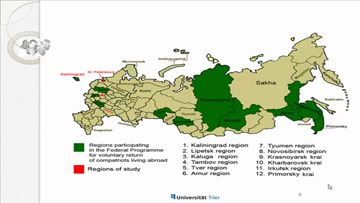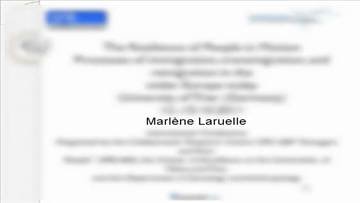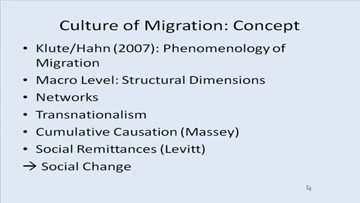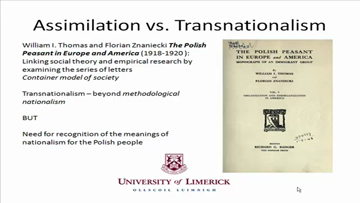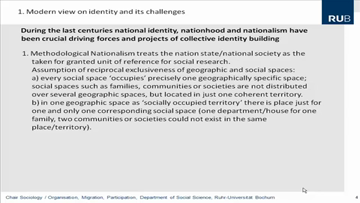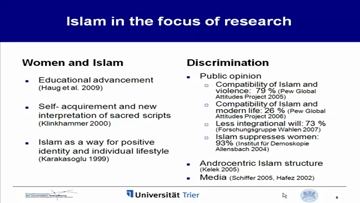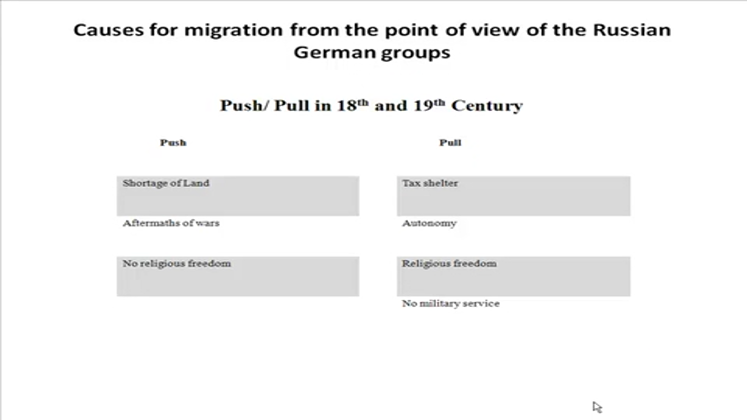The Impact of Religion
Religious Aspects of the Migration Process of the Russian Germans
In 1763, Katharina the Great proclaimed the „manifesto for foreign colonists for settling in Russia”, also called “the invitation manifesto”. The promise of religious freedom can be seen as one big pull factors why groups of people from German speaking countries migrated to Russia. Religion played a key role in the migration history of the Russian Germans: Its significance reached its peak in the 1930ies and 1940ies when religion became an ethnic marker for Russian Germans and they were forced to settle in “special residential areas“.
The aim of this presentation is to discuss if religion still plays a role for the Russian Germans when it comes to the decision to migrate, especially when moving to Germany. The results are based on a survey that was conducted in 2010 in Russia, Germany and Countries of the former Soviet Union. Many people state that they migrated to or want to migrate to Germany because they want to live as “German among Germans” which indicates that there is a strong sense of belonging to Germans as a people within this group. The most interesting question is, to what extend religion is only a vehicle that facilitates the slip from one cultural container into another and to what extend religious belonging is perceived as part of ethnic belonging.
Gerald Gredinger studied Sociology at the University of Vienna (Mag.rer.soc.oec.) and Studies in European Societies at the St. Petersburg State University in cooperation with Bielefeld University (MA.). He is currently working at the IFES (Institut für empirische Sozialforschung) Vienna and is a PhD candidate at Trier University.
Panel IV: The Religious Factor in Migration - October 14th, 2011
The Resilience of People in Motion
-
54498 Hits
-
|
-
2 Votes
-
|
-
16 Beiträge
Processes of immigration, transmigration, and remigration in the wider Europe today
Europe is a continent shaped by migration. Every year millions of people are migrating into the European Union. Others are emigrating from EU member countries. Many are leaving their homes and are trying to integrate into the host country, while others circulate between their home country and their “new home”, leave the country of entry, returning back to their “country of origin”, or they even migrate on to third countries.
Migration is a complex process with constraints and opportunities. Its flows have created different patterns, regimes and even cultures of migration. It involves voluntary and involuntary aspects, economic and non-economic issues, constructions and reconstructions between physical and symbolic spaces. This stipulates also new ways of theorizing and researching in the field.
Strategies of Survival, Strategies of Resistence
Migrants and migratory groups adopt as well as resist to challenges and expectations by the mobility itself or the receiving society. They perform resilient and innovative strategies of survival.
They are resilient by maintaining their culture(s), system(s) of belief, traditions, way of life etc. Yet, they are innovative being open for change, being transformers, innovators, entrepreneurs themselves. Therefore, adoption, change and/or innovation vs. resistance, continuity and/or resilience have to be seen as part of the migratory agency. The migrants’ culture of resilience, meaning the maintenance of core elements of their livelihood, has to be conceptualized in an ever changing world challenging the integrity and cohesion of any, but especially migratory groups.
The Conference
The aim of the conference is to discuss new theoretical approaches, methodologies and empirical research results on immigration, transmigration and re-migration topics. It focusses on changing European migration regimes and discourses since the fall of the iron curtain until today.
Contact
Prof. Michael Schönhuth
University of Trier
Universitätsring 15
D-54286 Trier
+49-(0)6 51-201-27 10 (Office)
http://transmigration.eu/
Zu
The Resilience of People in Motion
